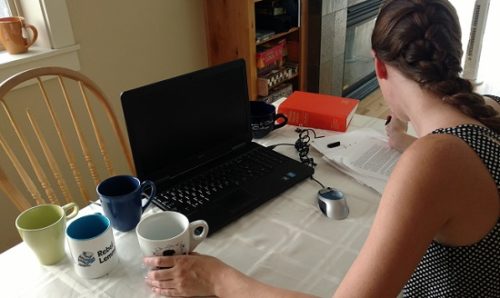Not too long ago, I met with a talented author friend of mine for coffee. Since grad school seems to occupy nearly every free second of my life, it didn’t take long for the conversation to move to editing. After discussing my nerves over taking over the editorial manager position for Ooligan, I quickly found myself nodding sympathetically as my friend discussed editors she’s worked with in the past—both good and bad.
Eventually it came about that my friend had never heard of a developmental (or substantive) edit. Even though the concept was new to me just a few years ago, when I was first going through the publishing process of my own novel, I was shocked that a many-times-published author had never heard of this level of edit.
On a basic level, a developmental edit evaluates the global concerns within a manuscript: structure, characterization, language, tone, etc. A good developmental editor will go through a manuscript while keeping the reader in mind—what they want to see. A good developmental edit is all about rounding out the story. Several authors have undergone this process, either with their publisher or by hiring someone. Since I find this particular type of edit both the most rewarding and the most challenging, I was more than happy to explain what it entails.
For me, the most pivotal moment in the conversation occurred when she looked at me, confused, and said, “If an author needs all that help, should they even be writing?”
She threw me for a little bit of a loop, at first. I wanted to defend all of the authors who have ever had to endure submitting their work, their precious brain children, to the terror of a developmental edit; however, a good dose of grad-school-induced exhaustion left me drawing a bit of a blank. Had I been running on all cylinders, I would have asserted that this level of edit is in no way an indication of failure on the author’s part. It is quite the opposite.
Sometimes a publisher has certain requirements from their authors when it comes to plot, characterization, or narrative: the primary foundations of a developmental edit. Ooligan isn’t necessarily like that (although we have specific submission guidelines), but we do believe in helping convert a good manuscript into the absolute best it can possibly be. We wouldn’t acquire a manuscript that we didn’t see a great deal of potential in. A good developmental edit is all about bringing out that potential.
From a publisher like Ooligan, a request to give a manuscript a developmental edit is an expression of genuine interest. In the last month, I have had the pleasure to take part in two developmental edits of manuscripts recently acquired by Ooligan. Both were completely different works in terms of plot and authorial style, yet each manuscript was equally engaging. One author has such an incredible skill for characterization that it’s impossible not to find every character he creates utterly engaging, deep, and interesting. Meanwhile, the other author is a veritable wordsmith when it comes to description and metaphor. Both authors are a joy to read, but that doesn’t mean other aspects of their manuscripts can’t be improved upon.
No author is perfect. My friend was the first to admit that a good copyedit would make a huge difference for one of her manuscripts. But when you ask someone to recommend a good book, they don’t talk about how wonderfully free it was of typos when they tell you what they loved about it. They talk about the characters and the story and that one scene that was described so perfectly they completely forgot they were sitting on their couch underneath a ratty old quilt while they read it.
A good developmental editor will find what makes a manuscript unique and beautiful and take it a step (or a mile) further. Because the manuscript that creates the most intriguing and complex characters you’ve ever read has value. The manuscript that plays with language and detail like an expert fencer toying with their opponent has value. So no, if an author struggles with plot or voice, they should not give up writing. Just like they would take their final draft to a copyeditor, they should take their first draft to a developmental editor. There is beauty in every story, and a good developmental editor will take that beauty and help turn it into something incredible.

